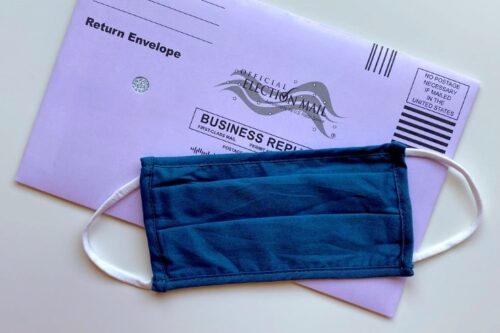
Photo provided courtesy of Unsplash.com.
By Falco A. Muscante II, Staff Writer
COVID-19 has undoubtedly changed many aspects of American life—including our electoral process. While this is certainly not the first time the procedural integrity of a presidential election has been called into question, the rapid changes to the electoral process have given rise to many legal battles across the country, and in the battleground state of Pennsylvania. [1]
Under the “Elections Clause,” state legislatures are permitted to choose the “‘Times, Places and Manner of holding Elections for Senators and Representatives,’ subject to Congress’s ability to ‘make or alter such Regulations.’” [2] Last year, the Pennsylvania General Assembly passed Act 77, establishing a “no-excuse” absentee voting standard similar to that of more than 30 states in the country, where any registered voter can vote by mail-in ballot without providing an excuse why he or she cannot physically be present at the polling place on election day. [13]
Four registered Pennsylvania voters who planned to vote in person and Pennsylvania congressional candidate Jim Bognet sued Secretary Kathy Boockvar and each Pennsylvania county’s board of elections, alleging various violations of the U.S. Constitution and seeking enjoinder of ballots received under those procedures. [4] The Third Circuit recently issued a precedential opinion where it affirmed the District Court’s denial of an emergency motion for a temporary restraining order or preliminary injunction with regard to the mail-in ballots, and held that, “when voters cast their ballots under a state’s facially lawful election rule and in accordance with instructions from the state’s election officials, private citizens lack Article III standing to enjoin the counting of those ballots on the grounds that the source of the rule was the wrong state organ or that doing so dilutes their votes or constitutes differential treatment of voters in violation of the Equal Protection Clause.” [5]
Article III of the U.S. Constitution vests the judicial power of the United States in “one supreme Court, and in such inferior Courts as the Congress may from time to time ordain and establish,” but provides an important limitation, such that the court may only rule on actual “Cases” or “Controversies.” [6] From the inception of the Constitution, it was generally understood that the courts would only issue decisions relating to specific cases or controversies and not decisions intended to be merely advisory or nonspecific. [7]
The Third Circuit did not rule on the constitutionality of either the deadline extension, where ballots postmarked by 8:00 P.M. on Election Day and received by 5:00 P.M. the Friday after Election Day would be counted, or the presumption of timeliness, where ballots received that Friday would still be considered timely if the postmark was missing or illegible unless a preponderance of evidence suggested otherwise. [8] It held that the plaintiffs did not have standing because the injuries alleged are undifferentiated and the plaintiffs “have not suffered a concrete, particularized, and non-speculative injury necessary under the U.S. Constitution.” [9]
For Pennsylvania, this means that all mail-in ballots postmarked by 8:00 P.M. on Election Day and received by 5:00 P.M. that Friday will be (and have been) counted, regardless of the constitutionality of the State’s election rules and guidelines, because citizens have relied on these guidelines issued by the State months in advance and federal courts should “not alter the election rules on the on the eve of an election.” [10]
[1] See Norman Ornstein, “Three Disputed Elections: 1800, 1824, 1876” (from After the People Vote, 4th ed.); John Fortier, “The 2000 Election” (from After the People Vote, 4th ed.).
[2] Bognet v. Sec’y Pa., No. 20-3214, 2020 U.S. App. LEXIS 35639 at *3 (3d Cir. Nov. 13, 2020).
[3] See Governor Wolf Signs Historic Election Reform Bill Including New Mail-in Voting, https://www.governor.pa.gov/newsroom/governor-wolf-signs-election-reform-bill-including-new-mail-in-voting/.
[4] Bognet, No. 20-3214, 2020 U.S. App. LEXIS 35639 at *10-11.
[5] Id. at *52-53 (quoting U.S. Const. art. I, § 4, cl. 1).
[6] U.S. Const. art. III, §§ 1, 3.
[7] See To George Washington from Supreme Court Justices, 8 August 1793, (https://founders.archives.gov/documents/Washington/05-13-02-0263).
[8] Bognet, No. 20-3214, 2020 U.S. App. LEXIS 35639 at * 8-9.
[9] Id. at *16.
[10] Id. at *50-51 (citing Purcell v. Gonzalez, 549 U.S. 1 (2006)).